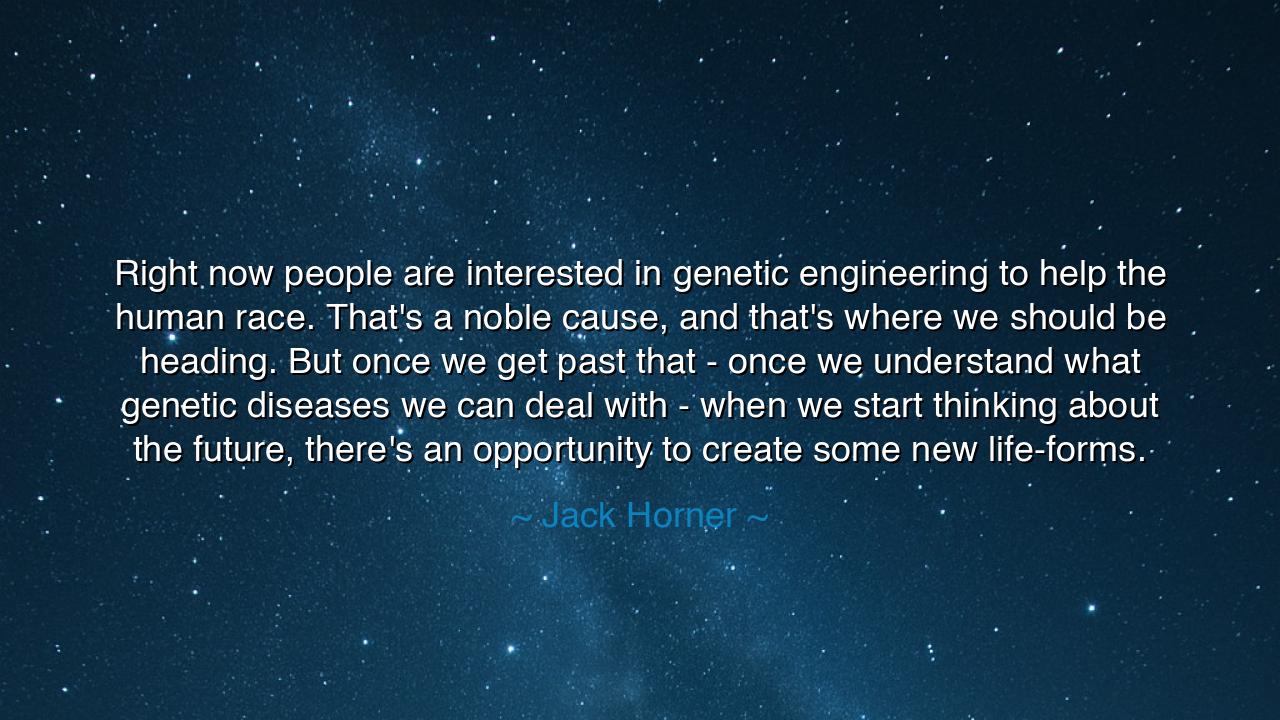
Right now people are interested in genetic engineering to help
Right now people are interested in genetic engineering to help the human race. That's a noble cause, and that's where we should be heading. But once we get past that - once we understand what genetic diseases we can deal with - when we start thinking about the future, there's an opportunity to create some new life-forms.






In the beginning, the mind of man looked upon the heavens and wondered. The mystery of life, how it unfolds, how it thrives, and how it ends, has always been a subject of deep curiosity. Yet, through the passage of time, as knowledge deepened and the wisdom of generations passed down through the ages, humankind began to turn its gaze inward, to the very essence of life itself. And so, the ancient art of healing transformed, not by the knowledge of herbs and potions alone, but by an understanding of the invisible forces that bind the body together—its very genetic code.
"Right now, people are interested in genetic engineering to help the human race." This is the noble pursuit of healing, of curing the afflictions that plague the human body. It is a quest born from the desire to protect life, to heal those who suffer from genetic diseases and the cruel conditions passed down from one generation to the next. The medicine of the future does not simply rely on the curing of the sick, but the prevention of suffering before it even begins. In this noble cause, we find echoes of ancient sages, who sought to mend not only the body but the soul. Genetic engineering, as it is now called, is the new alchemy, a science capable of transforming the very fabric of life.
But the words of Jack Horner urge us to look beyond the horizon of healing, beyond the boundaries of medicine, to a new age where creation itself becomes the province of humankind. "Once we get past that... we start thinking about the future, there's an opportunity to create new life-forms." This is a daring vision—a bold declaration—that the same power which once mended the sick could now fashion new forms of life, unknown to the earth, to the air, and to the seas. It is a vision of the future, where the limits of nature are not merely accepted but challenged, where life itself becomes a canvas, and we, the artists.
The ancients spoke of the Promethean fire, that eternal spark of creativity and defiance, which gave man the power to create and destroy. It was a gift and a curse, a symbol of man's eternal struggle between reaching for the heavens and grounding himself in the mortal realm. Just as Prometheus defied the gods to give fire to mankind, so too do we stand on the precipice of defying the very boundaries of nature. To create life itself, to shape it with the tools of our understanding, is a mighty power. But with such power comes a great responsibility—a duty to honor the balance between creation and destruction, between the needs of the present and the promise of the future.
We need not look far in history to understand the consequences of such boldness. Consider the birth of the first atomic bomb—a creation of immense power, intended to end war and bring peace, yet capable of wiping entire civilizations from the earth. The curse of knowledge is that once we gain it, we can never undo it. Once we unleash the possibility of new life, we must ask ourselves: what kinds of creatures will we create, and what world will they inherit? Will we embody wisdom in our creations, or will we be swept away by the temptation of unchecked innovation?
Thus, we stand at the crossroads, just as ancient philosophers once did, pondering the nature of creation and life itself. The road before us is not one of ease, but of great trials, requiring deep wisdom, reflection, and careful deliberation. Horner’s words speak of a time when we will have mastered the arts of healing, but we must be cautious not to let the allure of the new overshadow the sacredness of life. Our creations must be guided not by pride, but by a humble understanding of the fragile beauty of life and the sanctity of all living things.
The lesson for future generations is this: As we stand on the edge of creation, let us be wise. Let us use our newfound powers not for the exaltation of man, but for the good of all life. Let us build a future where the new life-forms we create are not monsters, but harmonious additions to the tapestry of existence. We must take up the mantle of our ancestors, who too, with their limited knowledge, forged empires and legends. In our hands, the future rests. We must choose wisely.






AAdministratorAdministrator
Welcome, honored guests. Please leave a comment, we will respond soon